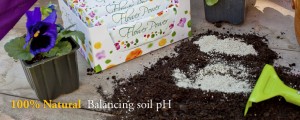Do you remember that little piece of paper in your chemistry lessons at school? The one that turned red for acid, blue for alkaline and purple for neutral? Well that was a litmus paper which is used as an indicator of PH levels and PH levels in your soil can affect how well your garden will grow and which types of plant are best suited to your soil.
PH or ‘Potential Hydrogen’ is an indicator of the balance of hydrogen ions against hydroxide ions in a solution such as soil. If the ions are balanced then you are said to have a natural PH soil, if the hydrogen ions are greater than the hydroxide ions, you have an acidic soil and if the hydroxide ions outweigh the hydrogen ions, you have an alkaline soil.
To give you an idea, each unit on the PH scale shows a tenfold increase or decrease in the acidity or alkalinity of your soil. In fruit for example, a lemon which has a PH of 2.0 is one hundred times more acidic than an orange which has a PH of 4.0.
The PH of your soil is important in gardening because it is a good indicator of the nutrients available in the soil that can be absorbed by your plants. For the nutrients to be absorbed they must first be dissolved and the PH affects this solubility of nutrients.
When planting your garden it is important to know whether your soil is alkaline or acidic as different types of plants need different types of soil to flourish. For example, camellias and lilies prefer an acid soil while lilies and hollyhocks thrive in more neutral soils with a PH of around 7.0. Most vegetables and plants grow best in soil in the range of 6.0 to 7.5 where the optimum level of nutrients becomes dissolved in the soil.
You can easily test your soils’ PH with DIY soil testing kits which are readily available from most garden centres or you can send a sample of your soil to a laboratory for more detailed analysis. This will enable you to either plant the types of plant in your garden that you know will thrive or you can modify your soil by adding lime to increase the PH or, to make it more alkaline, you can add acidifying materials such as elemental sulphur.
As different plants thrive in different types of soil; it’s always advisable to check the PH of your soil before planting. Either plant the plants that are best suited to your soil type or you can amend your soil PH by the methods mentioned above.
Soil preparation, whatever pH your soil, is always an important factor in ensuring success in your garden. Adding compost and soil treatments such as Zeradour Flower Power will help to bring the soil PH into balance as the zeolites in Flower Power act as an excellent buffer against soil PH fluctuations. Having a balanced PH soil will mean that a much wider variety of plants, flowers and vegetables will flourish in your garden

